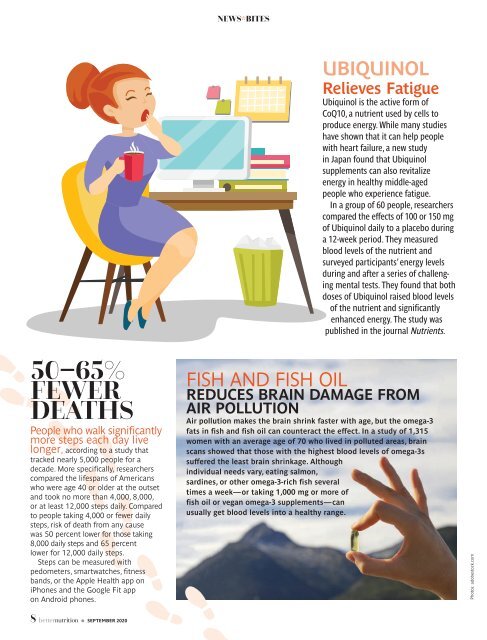You also want an ePaper? Increase the reach of your titles
YUMPU automatically turns print PDFs into web optimized ePapers that Google loves.
50–65%<br />
FEWER<br />
DEATHS<br />
People who walk significantly<br />
more steps each day live<br />
longer, according to a study that<br />
tracked nearly 5,000 people for a<br />
decade. More specifically, researchers<br />
compared the lifespans of Americans<br />
who were age 40 or older at the outset<br />
and took no more than 4,000, 8,000,<br />
or at least 12,000 steps daily. Compared<br />
to people taking 4,000 or fewer daily<br />
steps, risk of death from any cause<br />
was 50 percent lower for those taking<br />
8,000 daily steps and 65 percent<br />
lower for 12,000 daily steps.<br />
Steps can be measured with<br />
pedometers, smartwatches, fitness<br />
bands, or the Apple Health app on<br />
iPhones and the Google Fit app<br />
on Android phones.<br />
8 • SEPTEMBER 2020 NEWS*BITES<br />
UBIQUINOL<br />
Relieves Fatigue<br />
Ubiquinol is the active form of<br />
CoQ10, a nutrient used by cells to<br />
produce energy. While many studies<br />
have shown that it can help people<br />
with heart failure, a new study<br />
in Japan found that Ubiquinol<br />
supplements can also revitalize<br />
energy in healthy middle-aged<br />
people who experience fatigue.<br />
In a group of 60 people, researchers<br />
compared the effects of 100 or 150 mg<br />
of Ubiquinol daily to a placebo during<br />
a 12-week period. They measured<br />
blood levels of the nutrient and<br />
surveyed participants’ energy levels<br />
during and after a series of challenging<br />
mental tests. They found that both<br />
doses of Ubiquinol raised blood levels<br />
of the nutrient and significantly<br />
enhanced energy. The study was<br />
published in the journal Nutrients.<br />
FISH AND FISH OIL<br />
REDUCES BRAIN DAMAGE FROM<br />
AIR POLLUTION<br />
Air pollution makes the brain shrink faster with age, but the omega-3<br />
fats in fish and fish oil can counteract the effect. In a study of 1,315<br />
women with an average age of 70 who lived in polluted areas, brain<br />
scans showed that those with the highest blood levels of omega-3s<br />
suffered the least brain shrinkage. Although<br />
individual needs vary, eating salmon,<br />
sardines, or other omega-3-rich fish several<br />
times a week—or taking 1,000 mg or more of<br />
fish oil or vegan omega-3 supplements—can<br />
usually get blood levels into a healthy range.<br />
Photos: adobestock.com

















